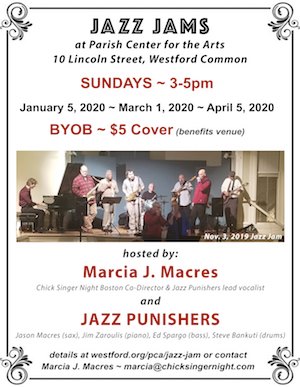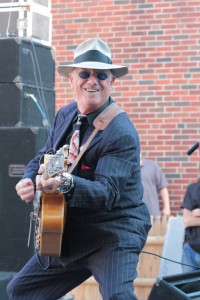 Doug Bell’s musical and personal life has been one of roller coaster like ups and downs and twists and turns. Bell, also known as Professor Doug Bell, has seen his life situation change faster than a TV channel. He’s been poor, rich, poor, then rich again. Bell played in a few obscure local bands before making a fortune in real estate and then finding outrageous success in his self-styled swinging, bluesy horn band Bellevue Cadillac.
Doug Bell’s musical and personal life has been one of roller coaster like ups and downs and twists and turns. Bell, also known as Professor Doug Bell, has seen his life situation change faster than a TV channel. He’s been poor, rich, poor, then rich again. Bell played in a few obscure local bands before making a fortune in real estate and then finding outrageous success in his self-styled swinging, bluesy horn band Bellevue Cadillac.
“I thought I was going to retire, but I guess there’s no chance of that any time soon,” Bell quipped. The Professor saw his band, in 1996, go from obscurity playing bars, weddings, and social events to playing large venues around the world and having their songs appear on national CD compilations, film soundtracks, and TV shows.
Turning down a career making gig that could’ve catapulted Bellevue Cadillac into fame and fortune turned out to be a career making move in and of itself. Bellevue Cadillac ended up on every front page in the world at a time when a revival in Swing music was spearheaded by bands like Cherry Poppin’ Daddies, Brian Setzer Orchestra, Big Bad Voodoo Daddy, Royal Crown Revue, and clever TV commercials by The Gap clothing stores.
The history bears repeating. Bellevue Cadillac played a gig on Martha’s Vineyard that had in attendance a very interested John F. Kennedy Jr.. Kennedy, unbeknownst to Bell, was planning a super secret wedding off the coast of Georgia and surreptitiously tried to book Bellevue Cadillac for his event. Kennedy told Bellevue’s agent that the band could not be told who they were being hired to play for.
Bell and his Bellevue Cadillac cohorts, not knowing who’d they be playing for, turned down the Kennedy wedding to stick to a previously booked wedding.
“The whole band had a meeting. We decided we were going to honor the original wedding by the people that booked us, because basically, it came down to this: no one bride on that day is more important than any other bride,” Bell said. “We made that decision, and it broke in the paper within the next couple of days, and then we were above the fold of every newspaper pretty much in the world in one day. We were covered on Hard Copy, and VH1, and Access Hollywood. Just about every news outlet that there was, there was a feature story on the band that didn’t play the JFK wedding.”
That began a demand for Bellevue Cadillac not because of their talent but because those who would book them knew they would show up. “We were then booked solidly for weddings,” Bell said. “We were immediately thrust off to Puerto Rico to play for the golden circle of Nynex. I asked them, ‘How did you come to this? Do you know our music? They said, ‘No, but we knew that if we booked you, you’d be there.”
The Don Law Agency kept Bellevue Cadillac booked for two years solid at about triple the usual pay. Once the buzz from the Kennedy refusal fizzled, Bellevue Cadillac began riding the Swing movement in the summer of 1998, beginning world tours, finding their songs on national CD compilations, and hearing their tunes on film and TV scores. Bellevue Cadillac was just behind in popularity the leaders of the new swing era, Big Bad Voodoo Daddy, Cherry Poppin’ Daddies, Royal Crown Revue, and Brian Setzer Orchestra.
Throughout Bell’s career he was a lead guitarist as well as a songwriter, a blues guitarist influenced by Mike Bloomfield, Eric Clapton, Muddy Waters, and Johnny Winters. Yet, the man who is well known as Bellevue Cadillac’s front man wouldn’t become its lead vocalist until much later in his career, late in Bellevue’s tenure too.
Songwriting, though, has always been one of Bell’s primary roles in his bands. It was his favorite songs he had been listening to that had pulled him into writing his own. Bell was composing songs in his first band, The Merits in 1966. The first few songs on Bellevue’s first album Black And White are mostly biographical.
“Body And Soul” is about a young kid in the suburbs waiting until later hours when radio can cut through static to bring him R&B stations from other parts of the country. “That’s really what helped me shape my songwriting and my love for the music,” Bell said. “It’s that story of what that music is to me. So ‘Body And Soul’ would be one of those fairly autobiographical ones. But it also speaks to all of us. Every summer had that favorite song. We would know all the lyrics and we all sang along, and that’s an experience we all shared, one way or another.”
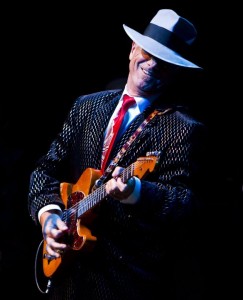 At a few different points in Bell’s life, he worked in the musical instrument retail business. Bell said it is a pattern in any musician’s life to keep going back to finding a way to make a living being around music. He worked at Beacon Musical Instruments from 1969 to 1970.
At a few different points in Bell’s life, he worked in the musical instrument retail business. Bell said it is a pattern in any musician’s life to keep going back to finding a way to make a living being around music. He worked at Beacon Musical Instruments from 1969 to 1970.
“It allowed me to earn a living while I was rehearsing and writing,” he said. “I was asked to join an original band and we went out on the road full time. As most things go, it didn’t work out, and so I had to go back to work again. I went to selling musical instruments again in Framingham. After that, I did another stint at Wurlitzer music for about ten years.”
Between his band Numbers not working out and other disappointments, Bell decided to sell out and go for the money. “I was mad,” he said. “It was a bad period in my life so (he figured) if it’s about money, I’m going go become a millionaire. I went into real estate, and I became a real estate developer for ten years. I made millions of dollars in that. Then, the banks failed, and I failed with them.”
At that low point, losing everything he built over the last ten years, left him with nothing to lose. That gave him a chance to think about what he really wanted to do. He dusted off his guitar, which he hadn’t picked up in ten years, and he began writing songs about what happens to people when they go through big changes like that. All of that material became the 1994 debut album of Bellevue Cadillac. Rebuilding his life and budget provided a lot of material.
“I had something like around 20 million bucks. I ended up seven million upside down and filed for personal bankruptcy,” he said. “I had a 6,000 square foot house and all the trappings, and then I had nothing. My marriage broke up. I had my wife and my son living in a development that I created, and I left it for a three hundred square foot apartment in Cohasset. I lived there for six years happy as a clam. So, I didn’t rebuild the personal fortune, and I didn’t seek to. I lived well and earned a living by running a small company until I could do this full time. That’s what you do. You downsize. You do what you have to do to survive it, and it was a wonderful six years in Cohasset and Hull.”
Getting back into music after working in real estate wasn’t easy. A good, loyal friend named Bill Edmunds, now deceased, had always wanted Bell to stay in music. “He’s the one that took that famous picture of me, the Flying Geezer, the one that’s on the logo. That’s his camera work. I miss him everyday. I really do. He’s a great man. He took me to see a Stevie Ray Vaughn show that he was reviewing at Great Woods. Ronnie Earl was there; a whole bunch of people were there I was reintroduced to. I looked around and I said ‘I can do this.”
At this same time, a person whose last name was Busha and lived near Bell, made Bell a mixed tape. Great artists from Louis Jordan to John Hiatt inspired Bell to build a band that could do all of those songs. Lady Day, Mike Bloomfield, Sam And Dave, John Coltrane, and early Elvis Presley were among the oldies artists that Bell got from that personal mix tape.
“I realized that music was part of my DNA and part of the tapestry that I live in, and I’d forgotten it,” he said. “It was sad to say, but I literally pushed it aside and forgot. It made all the difference, so I started to write songs in all those various genres because I wanted to be part of that.”
The experience of that mix tape was enormously powerful for Bell. “It really put margins on everything,” he said. “It kind of said, ‘This is your play pen. Go do it. You can do this.’ It lifted me, and I haven’t looked back since then.”
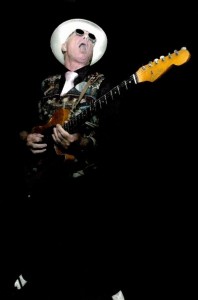 Bell began building his dream band in 1991, determined to record his own songs. He put together a group of musicians he was personal friends with. “I got a bunch of guys together that I’d known since I was a kid,” he said. I said ‘Listen, I want to form an original band, and it’s probably never going to make a dime. I’m not going to do anybody else’s music except shit I write, and it probably won’t go anywhere, but that’s what I want to do. Do you want to do it?’ They went ‘Yeah, we’ll do it with you.’ So, that was the beginning of Bellevue Cadillac.”
Bell began building his dream band in 1991, determined to record his own songs. He put together a group of musicians he was personal friends with. “I got a bunch of guys together that I’d known since I was a kid,” he said. I said ‘Listen, I want to form an original band, and it’s probably never going to make a dime. I’m not going to do anybody else’s music except shit I write, and it probably won’t go anywhere, but that’s what I want to do. Do you want to do it?’ They went ‘Yeah, we’ll do it with you.’ So, that was the beginning of Bellevue Cadillac.”
The 1994 debut album was made with producer Rob Fraboni, a connection Bell had made in his real estate career. Fraboni was looking to start a record label after having worked with Eric Clapton, Bonnie Raitt, The Band, Melissa Etheridge, Bob Dylan, and many others.
“For him to take an interest to produce that record was enormous,” Bell said. “Unfortunately, he couldn’t make that record label go, so we never really got released. So, it was the swing revival that really pushed us along in ‘97 when it first started to show up on the radar screen as a kind of music that kids liked. Really, nothing happened much until then. Then they took a song off that CD called ‘Black And White’ and it traveled. It went on the compilation with the best of swing. Rolling Stone Magazine called us one of the best two bands in the whole scene.”
A forgotten fact about Doug Bell is that he was a late bloomer as a front man, and that he became Bellevue Cadillac’s lead singer late in the band’s career. Black men originally fronted Bellevue. Gentleman Joe Cooper was the first Bellevue front man, but he retired. Then Bell found another front man named Gordon Sugarbear Michaels. “It was always because I heard an African-American voice in my head when I was writing. It always seemed to be that, and that is certainly not me,” Bell said.
When Michaels left to start a solo career, Bell began to rethink the sound of his music. Bell stumbled upon a singer he used to see in Boston from the Colwell Winfield Blues Band, which was one of the original bands experimenting with blues guitar and horns and taking blues in new directions. Its lead singer Charlie Sorrento was the next man Bell hit up to front Bellevue. Bell had to really put the arm on Sorrento, as he was retired from the music scene and was teaching at Berklee College Of Music. “We went out and had a great run of it, traveled, and he was just such a professional,” Bell said. “And then he too got the bug to be a solo artist and to write and record his own stuff in his own way.”
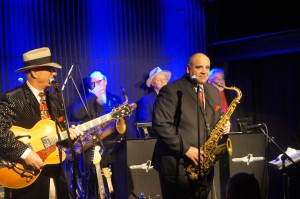 By that point Bell had been through enough singers. Fans kept telling him that they’d like to hear him sing more, and they wanted to hear him sing the songs to them because he was writing the songs to them.
By that point Bell had been through enough singers. Fans kept telling him that they’d like to hear him sing more, and they wanted to hear him sing the songs to them because he was writing the songs to them.
“I’m not a great singer. I’m a character singer like Lyle Lovett or Willie Nelson. I didn’t think that would necessarily work, but people, over time, convinced me,” Bell said. “And the fact that I always know that I’m going to show up for the show and be into it, I got more comfortable. And Charlie Sorrento gave me lots of vocal lessons. It was really helpful in helping me find my voice. You don’t get the greatest lead singing guy with chops in the world in the front but at least you get the honesty from the writer as a tradeoff.”
Though he was always confident coming out to play his guitar, Bell admits it took a lot of work to get the confidence to front his band. “I’m sure venues booking me were wondering what that band was going to be like without such and such, and it’s valid,” he said. “But the band is so strong and the material is so strong that everything was fine. Everybody just kept booking it, and now everybody thinks I’ve always been the lead singer.”
Bellevue Cadillac, during its first ten years, maintained the same lineup that had met with success from Shanghai to Tokyo To Moscow. Yet, those original players were not as used to traveling as they were used to playing near home. Bell was more comfortable traveling on buses and airplanes. So, the lineup inevitably changed, sometime after New Years Eve in 2001.
“They said, ‘Look, you have ideas that you want to do certain things, and we don’t want to hold that back. We’ve had a great run, so why don’t you do what’s in your musical head, and put together the band, the lineup that you really want to put together. No hard feelings, we’ll stay friends.’ That’s what happened.”
Bell needed new band mates. He found a guy who found a guy who found a guy and so on. Despite being around for ten years, Bellevue stumbled a bit before solidifying the new lineup. Bell’s friend of 35 years Tim Long(A.K.A Miles Long)has been there for most of the second lineup. Personality, in a band of that size, is as important as talent.
“I’ve had people sit in with the band, that just like an organism rejects an organ, the band says I don’t want that. The way the band is, the way they operate, sometimes it doesn’t work. All of a sudden I go, “Where’s such and such?’ And they start looking at the ceiling and they start whistling and I go ‘I guess he won’t be back.’”
The Bellevue guys can be as lively to hang with in hotel rooms and on buses. Yet, Bell has to let a lot of band stress roll off of his shoulders. “I’m the leader of the band, so they don’t like to include me in a lot of the stuff, because they like to bitch about me one way or another. That’s just the nature of the business. What I hear from other people is they say two things: They say that a green room hang with Bellevue Cadillac is probably one of the toughest hangs in the business because you have to be so on your toes, but it was probably the best hang because they are all funny.”
Bell said his band includes “these wacked out Italians that are like mob type guys that are constantly funny and busting them. They’re hilarious. That’s the thing. It’s all busting them. You gotta be sharp and you gotta take it, cause they’re all really smart guys. These guys have brains that don’t sleep.” That same energetic banter also plays out on stage, with Bell being the brunt of most of the jokes. He works his band mates hard and they blow off steam by giving him some guff.
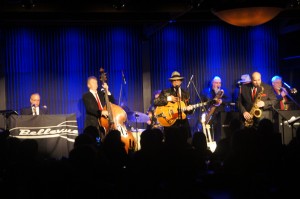 Bell’s songwriting is his pride and joy in Bellevue Cadillac He keeps coming up with songs with odd lyrical twists. As a singer-songwriter, Bell constantly keeps his ears perked for something new that hasn’t already been done a thousand times. Some of his material is humorous. Other songs are deeply personal and deadly serious. Bell’s song “Prozac Nation” was inspired by wondering if his father would not have committed suicide if that medication was available at the time.
Bell’s songwriting is his pride and joy in Bellevue Cadillac He keeps coming up with songs with odd lyrical twists. As a singer-songwriter, Bell constantly keeps his ears perked for something new that hasn’t already been done a thousand times. Some of his material is humorous. Other songs are deeply personal and deadly serious. Bell’s song “Prozac Nation” was inspired by wondering if his father would not have committed suicide if that medication was available at the time.
“I take a subject, and it will be a hard subject,” he began. “I’ll figure that people don’t want to be preached to. So, how do I bring a hard subject to it so that people will listen and hear what tends to be the front end of it? Instead of writing a sad sounding minor key song, Bell penned something that plays like a vibrant party song.
“If it’s an upbeat, crazy thing where I’m running in the mood along with the song, they get that there’s something funny going on. But the lyrics are really about my dad who committed suicide.”
Bell’s song “Cup Of Joe” was about Starbucks pushing mom and pop coffee shops out of the market. His number “Black And White” is about old cartoons that had great jazz musicians playing the soundtracks just to earn a living. “Jaja Opobo” is about a deposed 19th century Nigerian king. What make Jaja relevant today is Bell’s outlook and song craft.
“If you make him a character, people will listen to the story and learn about English colonialism and what happens to people when power wants the things that they’re sitting on. They’re little life lessons that are for good or for ill. Jaja was a hero to a million and a half west Indians.”
Bell’s father had things pretty rough, yet that might have been what honed Bell’s personality into a locomotive of determination. “He went down fairly early, so I imagine that’s informed my writing and the way I live,” the singer said. “I’m determined that I don’t want end up like that. You just fight your way out. You make sure those circumstance won’t happen. That’s my attitude. I’m a four time cancer survivor. I don’t just lay down, and I’ll go down fighting no matter what, and he didn’t somehow. And I don’t know what to make of that. I’ve written about it, but I don’t have answers for any of these things, and I don’t pretend to. But I do like creating the discussion, the discourse.”
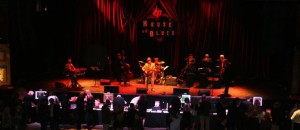 Bell is one tough cookie. He came from factory working parents and became a multi-millionaire at 40 on his own determination. He believes in working hard and dreaming up goals and going for them. “I swung for the fences,” he said, “and at some point I struck out swinging for the fences, and you get back on the bench.” Bell said to himself “Wah, I have to go back to the bench. What happened?” He answered himself: “Well, what happened, asshole, is you were swinging for the fences every time and probably should have tried some base hits or something. So, no crybabies. Go sit on the bench and figure out what you’re going to do next. And I guess that doesn’t answer how I am, but that’s how I think. Well, now, I got to go back and sit on the bench and figure shit out. So, I said, well music. That’s really what I want to do and I don’t care if people think it’s silly, and I don’t care if I wont make any money. I don’t care. I just don’t care. That’s what makes me happy. If by some fluke you discover what it is you’re made to do, all the stuff goes away, all the doubt, all the crap. It’s an amazing thing to know what the hell you’re supposed to do. It’s great.”
Bell is one tough cookie. He came from factory working parents and became a multi-millionaire at 40 on his own determination. He believes in working hard and dreaming up goals and going for them. “I swung for the fences,” he said, “and at some point I struck out swinging for the fences, and you get back on the bench.” Bell said to himself “Wah, I have to go back to the bench. What happened?” He answered himself: “Well, what happened, asshole, is you were swinging for the fences every time and probably should have tried some base hits or something. So, no crybabies. Go sit on the bench and figure out what you’re going to do next. And I guess that doesn’t answer how I am, but that’s how I think. Well, now, I got to go back and sit on the bench and figure shit out. So, I said, well music. That’s really what I want to do and I don’t care if people think it’s silly, and I don’t care if I wont make any money. I don’t care. I just don’t care. That’s what makes me happy. If by some fluke you discover what it is you’re made to do, all the stuff goes away, all the doubt, all the crap. It’s an amazing thing to know what the hell you’re supposed to do. It’s great.”
Battling cancer four times over is another on Bell’s list of things he has faced down in his lifetime. Two growths were not too severe but two were difficult. He has a leg up on research and early detection in that his wife is a cancer surgeon.
“Through two complete flukes they caught some very bad cancers very early on, and I got treated and survived,” he said. “What you can do is, again, you can get up on the field. I don’t live in the disease. What I do is, I like to tell other people that I survived it from ‘79 until now, and I’m still out there playing for you guys. So, it’s not a death sentence. You can think what you want, but it’s not necessarily a death sentence. Just fight it. Just go out there and do your thing and fight it. I guess that’s how I live life.”
Bellevue Cadillac plays a double bill with Roomful Of Blues at Blue Ocean Hall in Salisbury, Massachusetts on September 7th. Doug Bell will have in December a solo spot as an opener for a televised event; Dionne Warwick receiving the Ella Fitzgerald award at the Fontainebleau Hotel in Miami. He continues to play with Boston Legend All-Stars and with J. Geil’s Jazz And Blues Review.

